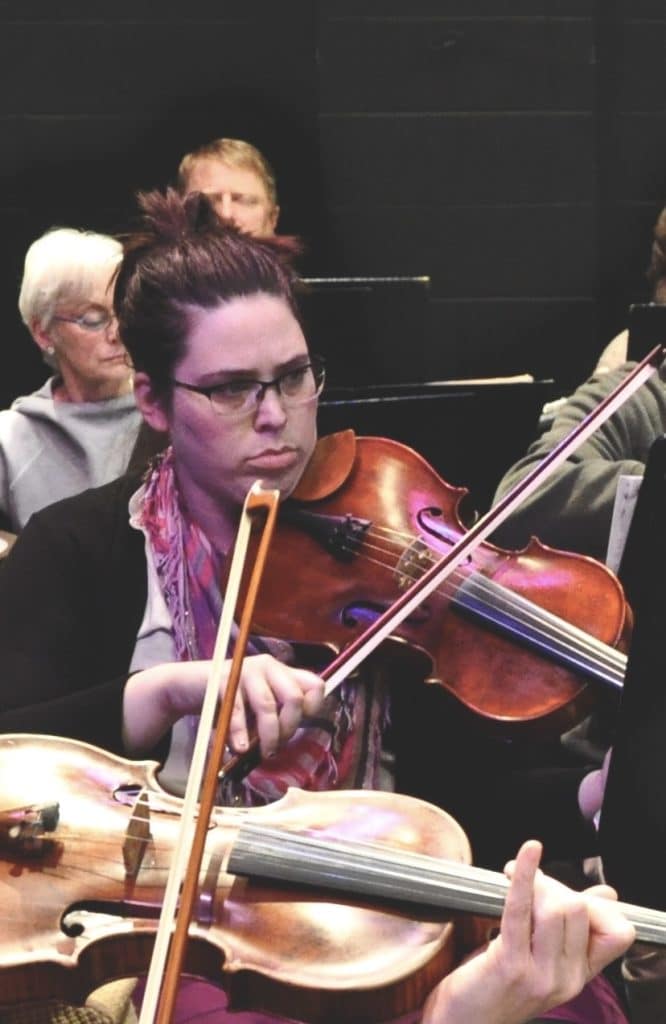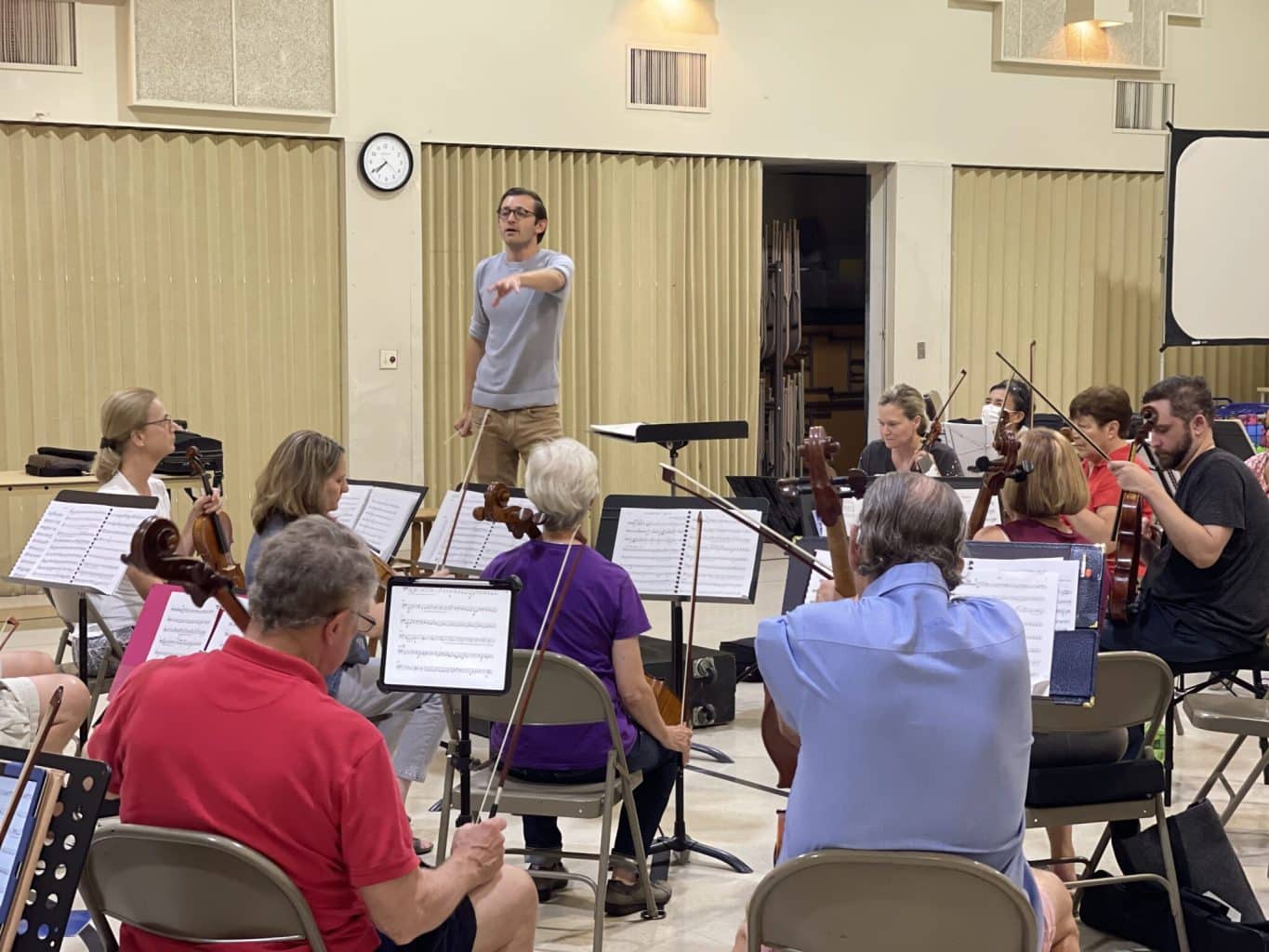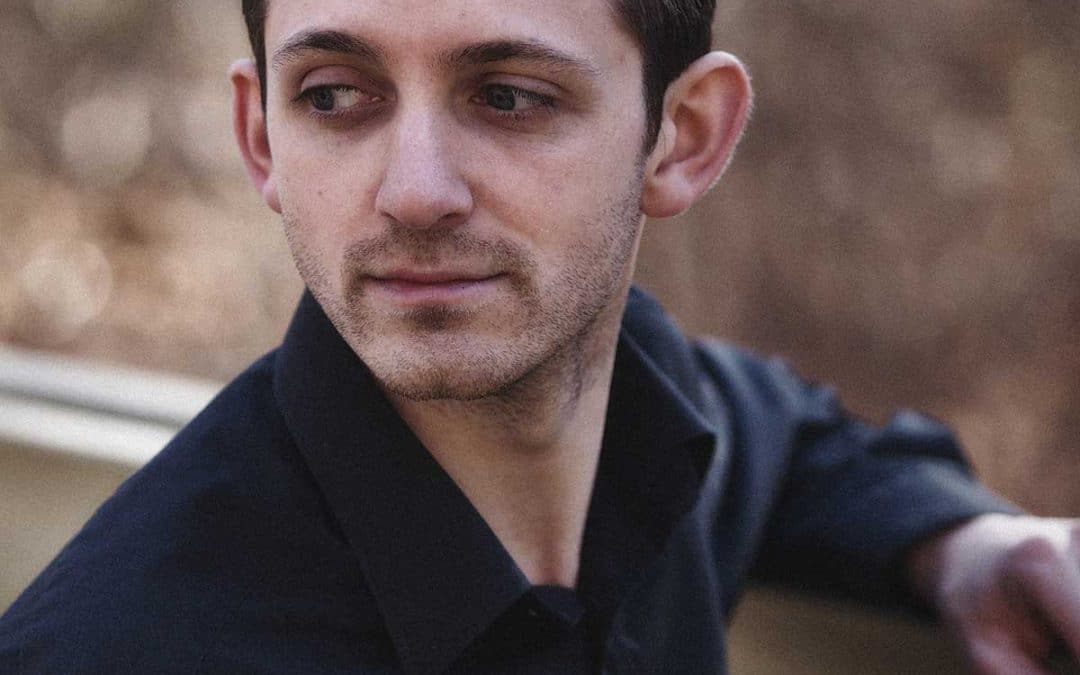Meet Sebastian Grand, conductor of the McLean Symphony joined by Mary Brambley, Board Chair and viola player of the McLean Symphony. The all-volunteer symphony — except for the conductor and the historian — meets for rehearsals weekly about nine months a year at the McLean Baptist Church and performs four or five concerts a year.
Getting involved with the McLean Symphony
Mary: I was tricked. I grew up in the area and then I left for about a decade. And when I came back, [Brambley’s day job is as the development officer for Historic Alexandria] my friend who I was band partners with in high school, was like, “Hey, why don’t we hang out now that you’re back in the area?” I said, Absolutely. So we went to a baseball game together. She got us tickets. We’re having a great time. And then out of nowhere, she goes, “Oh, by the way, I play in the McLean Symphony and they need more violas. Do you think you could join?” She had no idea if I was still playing. She didn’t know anything. She just randomly asked me, and I was like, Did you ask me to this baseball game so you could try to get me to play in the symphony? And she was like, “Yeah.” So that’s how I got back into it. So I started in September of 2015.
Sebastian: I really love working with community orchestras because they’re very unique to the places where they are and the communities that they’re kind of integral to and a part of. I got the sense pretty much immediately that it was a very kind of close-knit special group of people that had a really good track record of over 50 years of performing and had the potential to really continue to grow and serve the community musically.
Personally, for me, it was also about expanding my conducting career. I already have four orchestras that I work with [Grand is the Music Director of the Delaware County Symphony, PA, and holds Assistant Conductor positions with the Capital Philharmonic of New Jersey and the Bucks County Symphony Orchestra, and conducts the Chamber Orchestra of Philadelphia in an annual series] but the opportunity to regularly work with another group every week and build that relationship is always a really special opportunity. It’s proven to be, in just our first concert, I already feel welcomed and accepted and a part of the part of the community.
In the beginning
Sebastian: I’m a pianist and a cellist, and I still play the piano quite a bit but the last two or three years it really has shifted so that it’s much more conducting now than anything else. So really when I was in college, that’s maybe 15 years ago now, I conducted in my music program and then from that ran my own orchestra for about eight years. So through the process of doing those two things I was like, This is going to be an important part of my music making for sure. And then when I really started getting roles with previously established organizations, other community orchestras, some professional orchestras, some youth orchestras, and really the opportunity to work with people and to make music. I view conducting as really a very collaborative process. It’s not dictatorial at all, it’s about just trying to get the best out of people and developing relationships with people that allow them to play well.
Mary [pictured below]: I joined the Symphony in 2015 and then almost immediately went on the board. I play viola, and then I’m also the board chair. I also happen to run the email. I was doing that before I was board chair. Nobody wants to take over it because they’re fearful that that’s the board chair’s job. I’m like, No, no, no. I just never stopped playing, since I was nine. It’s been 29 years. I was a music major for a little bit, but I realized that that’s not what I wanted to do. So, I didn’t graduate with it. I’d done a lot. I went pretty far with it, but I didn’t never finish. I knew I was never going to be a musician. So I think I just played because I enjoyed playing.

Mary Brambley, Board Chair and viola player of the McLean Symphony

Sebastian Grand, the McLean Symphony’s new conductor — only it’s second in it’s 53-year history. That role and the Symphony’s librarian are the only paid positions of the active roster of the about 75 volunteer musicians who over the years have ranged from high schoolers to 80somethings.
From Guernsey, UK to McLean
Sebastian: I was really surprised, in a good way, particularly with regard to how much is going on. America doesn’t necessarily project the most culturally interesting and diverse image when you’re outside of the big cities. But I think what I was really pleased about was, Okay, so you don’t have to be in New York or Philadelphia or the center of DC to find like really enriching culture. For me career-wise, that was just wonderful to find out about, and also life lifestyle-wise to know that you can live in the suburbs and still have a huge amount going on.
Goals of the McLean Symphony’s first new director in 53 years
Sebastian: There’s a lot of networking to be done, a lot of possible collaborations to be done. Personally, I would love to do something with a chorale or a choir in the area. That would be a wonderful opportunity. There are things you can do with ballet companies and other art forms. There’s certain music where you can collaborate with the visual arts — you can have pictures or paintings that represent music. And then there’s a lot of collaboration you can do on the education side, building outreach projects and trying to get younger people more involved in the orchestra too.
[In terms of music] you’re really trying to find music and repertoire that suits the audience. McLean Symphony has always had a tradition of doing some repertoire that is unusual. Trying to find the right balance between continuing to explore things that have been unnecessarily neglected, but also to do some real popular works that you just guarantee that everyone’s going to enjoy. Basically to continue to try and build the standard of the orchestra. We’re always interested to hear from new players, particularly in the string sections, if they’ve had orchestral experience or playing experience in the past, and to try and be the kind of hub where if you are a musician and you’re in the area, this is the orchestra that you should come to if you want to be challenged and play really good quality orchestral music.
Mary: We are a non-profit, so fundraising is very key to what we do. It’s how we stay alive. A former player left us a very generous bequest about a decade ago and we are coming to the end of that bequest. We need to really ramp up what we’re doing because we count on ticket sales, we count on sponsorships, we have a program book and people can buy ads in it. It’s counting on the generosity of people and now we’re trying to expand it because I think we came out of COVID, we had an amazing 50th anniversary and now we’re ready to move on to the next thing and be even bigger than where we were. More people know about us because of the 50th anniversary so we’re just trying to hit on that while we’re still a little bit hot. Last year was kind of a shock year that we thankfully got through and now we have Sebastian. So now it’s like, Okay, let’s, let’s pick back up running.
The McLean Symphony: Something for Everyone
Sebastian: There are two key takeaways for me. The first one is that we’re there to play music right in this community that people would enjoy coming to. It’s accessible, it’s interesting, you’re up close and personal, you’re right there, super close to the orchestra, which you don’t always get in these big concert halls. And, there’s a concert for everyone. Even if you’re, Okay, I don’t wanna go see a big symphony, come to the Christmas concert, or come to the Capital One Hall in June where it’s small selections of different pieces. So there’s a real concept for everyone. And then the second one is just the link to the players — if there are players interested that want to come and try us out, then we are an outlet for their musicality. We’re doing really well in terms of numbers, but it’s always good for people to be aware that we’re here because so much talent just gets like put into the closet.
By: Gayle Jo Carter
Gayle Jo Carter is the editor of McLean Today.
Do you know someone in McLean who would make an interesting interview for TALK? Click here to nominate them.

